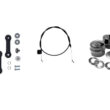Toyota Motor Corporation is a Japanese multinational automotive manufacturer that has been producing some of the most popular cars in the world since 1937. With its headquarters in Toyota City, Aichi Prefecture, Japan, Toyota is a highly respected brand that owns several subsidiaries, including Lexus, Daihatsu, and Hino Motors.
Toyota’s success can be attributed to its strong focus on innovation, which has led to the production of many popular models over the years, such as the Corolla, Camry, and Prius. As one of the top automakers in the world, Toyota continues to push the boundaries of what is possible in the automotive industry.
Bottom line: Toyota’s solid ownership structure has helped the company to succeed over the years, and its commitment to innovation ensures that it will continue to be a major player in the automotive industry for years to come.
Introduction to Toyota’s Ownership Structure
Toyota is one of the most recognizable and successful car manufacturers globally, with a massive and loyal customer base. However, behind the brand’s success lies a complex ownership structure that has evolved over the years. At the core of this structure is Toyota Motor Corporation, a Japanese multinational corporation that produces a range of automobiles, including luxury vehicles, commercial trucks, and buses.
Historical Background: Toyota’s Early Days
Toyota’s history dates back to 1890, when founder Sakichi Toyoda invented a power loom. The company later diversified into automotive production, with the launch of the Toyota AA, the company’s first passenger vehicle. However, during World War 2, Toyota was forced to produce trucks for the Japanese military before resuming civilian production in 1947. It was during this period that the company began to develop its lean manufacturing philosophy, which has become one of its defining characteristics.
Toyota’s Success and Growth
Toyota’s commitment to innovation, quality, and efficiency has created a loyal customer base worldwide, with the brand known for producing reliable and durable vehicles. The Toyota Corolla, in particular, has become a household name globally, with millions sold since its launch. In recent times, the company has expanded into new markets and product lines, including hybrid and electric vehicles.
Changes in Ownership Structure over the Years
In the early days of Toyota, the Toyoda family owned the company entirely. However, in 1937, the Toyota Motor Company was established as a separate entity, owned by shareholders. Later, Toyota became a public company in 1949, with shares listed on the Tokyo and Osaka Stock Exchanges. In the 1980s, the company established production facilities in North America and Europe, marking a significant shift in its ownership structure.
Current Ownership Status: Toyota or Parent Organizations?
Toyota is primarily owned by Toyota Motor Corporation, which holds the majority of its shares. However, the company is part of a larger corporate structure, with several other entities playing a significant role. These include the Toyota Industries Corporation, which is involved in materials handling equipment and other industrial products, and the Denso Corporation, which is a supplier of automotive components.
Exploring Toyota’s Parent Organizations
Toyota Industries Corporation, formed in 1926 by Sakichi Toyoda, is involved in manufacturing and selling industrial equipment such as forklifts and textile machinery. It’s also the parent company of Toyota Material Handling Group, one of the world’s largest manufacturers of forklift trucks. The Denso Corporation, on the other hand, is Toyota’s largest supplier of automotive components, including air conditioning systems and engine control modules.
Impact of Ownership Structure on Toyota and the Global Car Industry
Toyota’s corporate structure has contributed to its success over the years, helping it weather various industry downturns and emerging stronger. By having diverse product lines and involvement in various industries outside the automotive sector, Toyota has been able to leverage economies of scale, share resources, and optimize efficiency.
Furthermore, Toyota’s ownership structure has been essential in building a stable financial foundation, particularly in the wake of the 2008 global financial crisis that rocked the car industry. Its ability to manufacture a range of products, diversify operations, and have access to a range of financial resources has seen the company remain profitable and stable even during challenging times.
Future Prospects for Toyota and its Ownership Structure
Looking ahead, Toyota continues to explore new opportunities, particularly in the areas of autonomous driving, electric mobility, and advanced technologies. The company is likely to continue its commitment to innovation and efficiency in new and even more ambitious ways.
In conclusion, Toyota’s ownership structure is unique, complex, and has changed significantly over time. Nevertheless, it has been critical in contributing to the company’s global success, making it one of the world’s largest car manufacturers. Toyota remains a leader in the industry and is set to remain so in the coming years.



